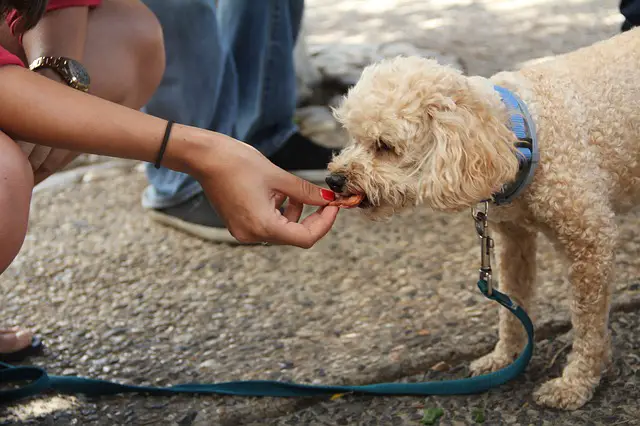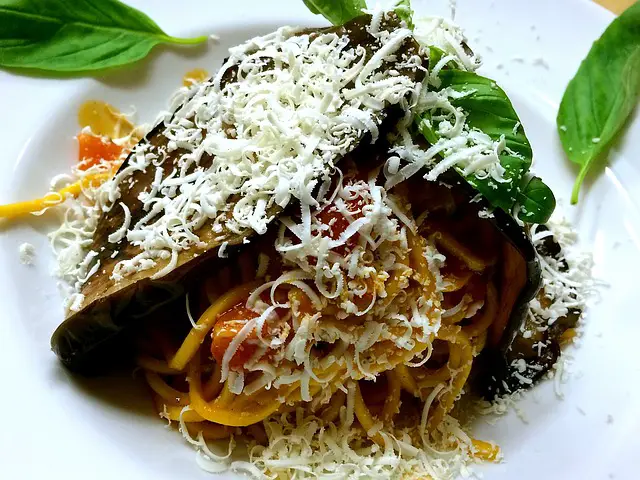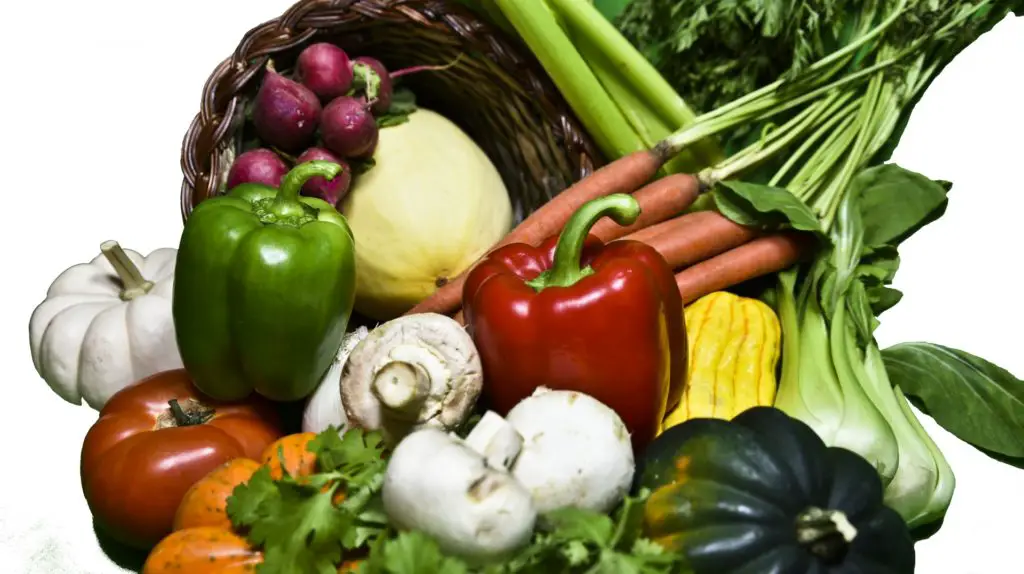‘Can dogs eat eggplant parmesan, mom’? – My son posed this question one evening, during dinner. Our 8-year old Cocker Spaniel wanted some eggplant parm from his plate.
I told him that I wasn’t too sure and that I’d check with my dog-expert circle.
Turns out, dogs are allowed to eat eggplant, albeit in small quantities. So, if your dog is begging for that delicious piece of eggplant parmesan, then go ahead, give it some. Of course, there are some exceptions where you mustn’t feed eggplant – such as to dogs with kidney stones, food allergies, or arthritis.
In this guide, I will tell you exactly how to feed eggplant to your doggo. So, read on!
Can Dogs Eat Eggplant?
Dogs can eat eggplant infrequently and in small quantities. You may feed a bit of well-cooked eggplant to your dog as an occasional treat. Eggplant belongs to a group of vegetables called nightshade vegetables which contain alkaloids that could increase inflammation in dogs. That is why; the only way to feed dogs eggplant is in moderation.
In the next section, I will talk about benefits of eggplants and also when you should not feed it to your dog.
Health Benefits of Eggplants

Eggplants have several benefits at least in humans and it is possible that the same our extended to our canine companions as well. It is one of the few purple colored vegetables which can provide you and your pet with many antioxidant benefits. There are several varieties of eggplants too (also called aubergines). Here are their main benefits:
1. Rich in antioxidants
Nature has provided us with many colorful fruits and veggies. They help provide many great vitamins and minerals to us.
Eggplants have a purple-colored skin which contains many phytonutrients. In fact; a recent report from AARP states that purple colored vegetables are superfoods. The anthocyanin phytonutrient in these vegetables can prevent brain inflammation, certain cancers, and even prevent heart diseases.
2. Reduce blood sugar
Eggplant contains chlorogenic acid which can inhibit blood glucose concentrates. So, there is some evidence that eggplants could help reduce blood sugar and prevent type II diabetes in humans. More studies are needed in canines but we could assume that the same benefits might apply to dogs as well.
3. Can help in weight loss
Being low in calories and fat content, eggplants make a healthy treat. They are also rich in fiber and can help give that ‘full’ feeling. This can reduce appetite and aid in weight loss.
Is Eggplant Safe for Dogs?

Eggplant is mostly safe for dogs. It certainly does not belong in the list of unsafe human foods to feed canines. Even the ASPCA has not mentioned eggplant in their list of toxic foods for dogs. However, it is important to bear the following things in mind when it comes to feeding eggplant to dogs.
1. Contains no real nutrition to canines
Eggplant does not provide much nutrition to our dogs. Dogs are primarily carnivores and they need meat for protein. Eggplants do not provide much protein and they are not a balanced food for dogs.
Yes, you can certainly feed dogs small pieces of cooked or raw eggplant but only as a treat. Do not make it your dog’s main meal. Your pet needs balanced diet with protein, healthy fats, complex carbohydrates, and vitamins and minerals.
Eggplants are primarily carbohydrates and they contain vitamins and minerals. But they hardly contain protein which dogs need for muscle mass maintenance.
So, despite being a ‘safe’ food, your dog doesn’t really need eggplant other than an occasional treat.
2. Not safe for sick dogs
Also, eggplants belong to the nightshade family. These veggies contain an alkaloid called solanum melongena which can increase inflammation in humans and canines alike. So, if your dog is already battling inflammatory conditions like kidney stones, arthritis, etc. then it is best to not feed it too much eggplant.
3. Not for sensitive dogs
Some dogs have sensitive digestion. They could have food intolerances and food allergies. There is a chance that such dogs could have an allergic reaction to eggplant too. So, if you aren’t sure if your dog has an eggplant allergy, then it is best to avoid feeding it this nightshade vegetable. If needed, consult your vet. Signs of eggplant allergy include vomiting, itchy skin, hot spots, diarrhea, and abdominal pain.
When Should Dogs Not Eat Eggplant?

Dogs and humans alike can benefit from the phytonutrients in eggplants.
However, as mentioned earlier, eggplants are a nightshade vegetable. Nightshade veggies like bell peppers, potatoes, and tomato plant contain an alkaloid called solanine which might aggravate arthritis and other inflammatory conditions like gout, etc.
However, there is no evidence to support this for a fact.
Despite this, many alternative practitioners and natural medicine specialists recommend avoiding nightshade veggies like eggplants to people with arthritis, kidney stones, etc.
Also, as mentioned earlier, some dogs could have eggplant allergy and they might show symptoms like vomiting, upset stomach, diarrhea, and even skin issues.
So, if your dog has any of these problems, it is best not to feed eggplant in excess. You can always discuss the matter with your vet, when in doubt. As always practice moderation when you want to add anything new like eggplant to your dog’s diet.
Can Dogs Eat Eggplant Raw?
Yes, if your dog does not have any kidney issue, inflammatory diseases, or arthritis, you can feed your pet a piece or two of raw eggplant.
The thing with raw eggplant is that it isn’t too tasty. Most dogs will spit it out.
That is why; it is best to feed sautéed, boiled, baked, grilled, or steamed eggplant to your dog.
You can even feed your dog a small bit of eggplant parmesan, a delicious Italian dish.
Another disadvantage of raw eggplant is that it could contain harmful bacteria. This can be harmful to dog’s stomach and could cause vomiting, abdominal pain, and other symptoms. So, only choose organic eggplant and always cook it before feeding your fur buddy.
Can Dogs Eat Fried Eggplants with Egg?
Yes, eggplant sautéed in a bit of olive oil and mixed with scrambled eggs is a delicious meal for your dog.
As always, start small, especially if you are feeding eggplant to your dog for the first time.
(I have discussed later in this guide how much eggplant is safe for your dog to eat once in a while).
Use organic eggplant to minimize chemicals. Do not feed eggplant to dogs with inflammatory health issues, allergies, etc.
Can Dogs Eat Eggplant Parmesan?

Eggplant parm is also okay to feed your dog in moderation. However, note that eggplant parm contains tomato sauce and tomatoes are not a safe food to feed your pet. So only feed eggplant parmesan in very small quantities.
Also, eggplant parm is traditionally made with cheese and oil. In fact; it contains tons of oil.
Cheese is okay to feed dogs but it is calorific and in excess, can even cause stomach upset in dogs. The same thing goes for oil. Even if you feed your dog olive oil, in excess, it can be fattening for dogs.
The eggplants also soak up a lot of oil during the cooking process and that can add to your dog’s daily calorie intake. So, if your dog is on a calorie-deficit diet, it is best not to feed eggplant parmesan to it. Instead, you can feed sautéed, baked, or grilled eggplant in moderation.
How Much Eggplant is Safe for Dogs to Eat?
To know how much eggplant your dog can eat, consider the number of calories it contains.
100 grams of eggplant contains about 25 calories.
Your dog’s calorie needs will vary based on its age, weight, activity levels, and overall health.
Most dogs need 25 to 30 calories per pound of body weight per day to maintain health.
So, if your dog weighs about 10 lb., it should have about 300 calories per day for normal activity levels. For higher activity, you can feed a little bit more as recommended by your vet.
Also, eggplants are best fed as treats and not as a dog’s main meal. Dog treats should only constitute about 10% of its total daily calorie intake.
So, in the example above, your dog should only have about 30 calories worth of treats per day. Since eggplant contains about 25 calories in 100 g, you can feed your 10 lb. dog only 100 to 110g of eggplant every now and then.
Are Eggplant Plants Poisonous to Dogs?
If you are planning to add eggplant plant to your kitchen garden, then it is best to do it in an area where your dog won’t have access to the leaves of the eggplant plant.
Eggplant leaves are toxic to dogs. Most dogs know which leaves are toxic and will avoid them. However, a puppy could accidentally chew eggplant leaves and that can be harmful to a young or immune-compromised dog.
Eggplant leaves can even lead to symptoms of toxicity like vomiting, seizures, kidney failure, etc.
So, please do not keep eggplant leaves accessible to young dogs.
How To Feed Eggplant to Dogs?
- As stated earlier, please only feed organic eggplant to dogs. This will reduce its chemical content.
- Wash the eggplant well before feeding. De-seed the vegetable to remove the alkaloids.
- You can try feeding it raw, but most dogs dislike raw eggplant.
- Instead, you can boil, bake, sauté, or grill the vegetable before feeding.
- Do not feed your dog eggplant in excess.
- Always start small.
- If your pet has food allergies or inflammatory conditions like arthritis, avoid feeding eggplant to it.
What Other Nightshade Vegetables Can Make Dogs Sick?

Vegetables belonging to the Solanaceae family such as potatoes (not sweet potatoes), tomatoes, bell peppers, and eggplants are harmful to dogs in large quantities.
In small quantities, these won’t cause any inflammation. But, in excess, they can lead to inflammatory flare-ups in the form of skin issues, stomach problems, and even arthritis pain in dogs having these conditions.
Avoid exposure of your dog to the above nightshade vegetables. The unripe vegetables are even more harmful. This means that red tomatoes are slightly better than green tomatoes for your dog’s health.
In any case, it is best to remove the seeds or pits of these fruits and vegetables before feeding as this is where majority of the harmful alkaloids are present.
What Vegetables Can Make Dogs Sick?

Here is a list of vegetables that could make dogs sick:
- Avocadoes – their pits are especially harmful.
- Asparagus – It is tough for dogs to eat it raw and if you cook it, it loses nutrition.
- Mushrooms – These can be toxic and there are many varieties of it which can cause symptoms of poisoning in dogs.
- Onions, leeks, garlic, and chives – these are not nightshade vegetables, but they contain sulfates and allium which can cause poisoning in dogs. Japanese dog breeds like Akita and Shiba Inu are even more susceptible to it. Never feed any dog breed onions.
Which Vegetables Can Dogs Eat Safely?

Here is a list of vegetables which dogs can eat:
- Broccoli – This is a very healthy vegetable for dogs and you can feed it raw or cooked. It has high dietary fiber, vitamin C, and other nutrients that are beneficial for your dog’s health.
- Brussel Sprouts – These are also very safe and healthy for dogs. However, do follow moderation as excess quantities could make your dog gassy.
- Cauliflower- This is a safe vegetable for dogs.
- Celery – This crunchy vegetable is healthy for your dog’s heart health and can even ward off cancer. It is also rich in vitamin A, C, etc.
- Carrots – Carrots are a wonderful vegetable for dogs. Their crunchy texture can prevent dental issues and reduce tartar and plaque. They also supply vitamin A to your pet.
- Green bean – high in fiber and can keep your pet full.
- Spinach – good source of iron, protein. However, practice moderation as it also contains oxalate which inhibit calcium absorption.
Conclusion- Can Dogs Eat Eggplant?
Yes, dogs can eat eggplant in moderation. You can feed cooked eggplant – sautéed, grilled, baked, or even a bit of eggplant parmesan to dogs.
Never feed eggplant to dogs having inflammatory health issues, kidney stones, arthritis, and to those with food allergies. Also avoid feeding the seeds and eggplant leaves as they can be toxic to dogs.
Do check out other topics in Dog Food on this website to know which human foods your dog can eat safely and the ones to avoid.


